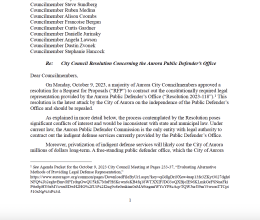DENVER – The American Civil Liberties Union and the ACLU of Colorado filed a lawsuit in a Colorado federal court today against the Sheriff of Jefferson County in Colorado arguing that he unjustifiably and illegally imprisoned a Colorado resident for 47 days last year simply because federal immigration officers suspected that the man was here in violation of federal immigration laws.
“Without any legal authority whatsoever, Sheriff Ted Mink imprisoned our client and kept him in legal limbo for 47 days, with no charges pending, no opportunity to see a judge, and no opportunity to post bail,” said Mark Silverstein, ACLU of Colorado Legal Director. “Our fundamental constitutional values prohibit depriving any person of liberty without due process of law.”
Luis Quezada, the ACLU's client, was arrested and taken to the Jefferson County Jail in May 2009 for failing to appear in court on a traffic charge. He promptly resolved the traffic charge, and the county court judge ordered him released.
Quezada was not released, however, because Immigrations and Customs Enforcement (ICE) sent the jail an Immigration Detainer advising that it was investigating whether Mr. Quezada was violating immigration laws. An Immigration Detainer instructs a jail or prison to hold a particular inmate an additional 48 hours (excluding weekends and holidays) after the inmate’s release date. The detainer states that its purpose is to provide adequate time for ICE agents to determine whether to take the inmate into federal custody and begin formal deportation proceedings.
When ICE finally took Mr. Quezada into custody in mid-July, 2009, the agency immediately allowed him to be released on bond while he defended himself in immigration court.
“By allowing Mr. Quezada to post bond and be released, ICE determined that our client poses no danger to the community and is not a flight risk,” said Dan Williams, of Faegre & Benson and cooperating attorney for the ACLU of Colorado. “No right is more firmly ingrained in our Constitution and our understanding of freedom than the right not to be left in jail indefinitely without charges filed or an opportunity to post bail,” continued Williams. “Yet that is what happened here. This suit seeks to compensate Mr. Quezada, and we hope that it will serve as a wake-up call to law enforcement throughout Colorado to stop this lawless deprivation of liberty.”
The Colorado ACLU has received multiple complaints of similar cases in which Colorado jails held suspected immigration violators without legal authority. To address the recurring issue, the ACLU of Colorado wrote to all Colorado sheriffs in the fall of 2008, advising that any legal authority of an Immigration Detainer expires after 48 hours. The ACLU also asked Colorado sheriffs for copies of any written policies instructing jail deputies how to proceed when the jail receives Immigration Detainers. The Jefferson County Attorney responded that the sheriff’s office had no applicable written policies.
ICE routinely issues immigration detainers to law enforcement agencies around the country as part of various immigration enforcement initiatives, including Secure Communities, the Criminal Alien Program, and 287(g). In addition to causing racial profiling and harming public safety, those initiatives raise the risk that agencies and officers will face increased claims for damages as a result of cases like Quezada’s.
“ICE is issuing detainers by the thousands in an attempt to use state and local police and sheriffs as adjunct federal immigration officers,” said Omar Jadwat, a staff attorney with the ACLU Immigrants’ Rights Project. “However, police officers and jailers are always required to obey the Constitution and they simply cannot imprison a person in this way, even if an immigration detainer exists. States and municipalities open themselves to liability when they treat ICE detainers as if they were sentences imposed by a court.”
Attorneys on the case, Quezada v. Mink, include Jadwat of the ACLU Immigrants’ Rights Project; Silverstein and Taylor Pendergrass of the ACLU of Colorado; and Williams, of the law firm of Faegre & Benson.
Read a copy of the complaint here.
